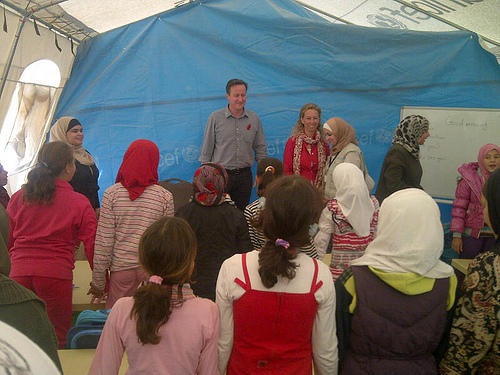12th November 2012
Yes, Prime Minister!
My Prime Minister David Cameron was in town last week. Maybe you’re wondering what it’s like arranging a visit by a leading politician? And what it’s like having him stay in your home?
For any Ambassador, a top-level visit is the icing on the cake of what we do. Embassies try to get to know the country they’re living in, meet lots of people and talk about the big issues. But a visit by your head of government is a unique opportunity to do something special, raise the profile of your country and announce something new.
The first thing about a visit by a Prime Minister is that it creates a lot of work. No surprises there. The PM’s office (known in London as No 10) want to know what the main issues are and what we want to achieve. The priorities for this short stay wrote themselves: Syria, the plight of the refugees in Jordan, Jordan’s economic and political reform and Palestine.
The crucial thing to get right is the logistics. Here we depended on Royal Protocol and the protocol experts at the Ministry of Foreign Affairs. They did a fantastic job fixing the airport, booking helicopters and cars and nailing down the details of the meetings. Protocol can be a thankless task: absolute attention to detail is the name of the game. But you also have to have your fingers crossed that the weather, the traffic or some other unforeseen “unknown” doesn’t cause hitches.
Then there is the media. The Prime Minister travels with an embedded team of journalists whose output is then fed to other media outlets. We also had the renowned BBC journalist Frank Gardner and a group of journalists from the main British newspapers in tow. They too want the story and the right camera angle – and all in time for the breakfast news at home.
The Embassy has a close interest in thinking through the main media messages. On this occasion, the focus during the visit to the Syrian border was on the need to remove Assad and stop the bloodshed in Syria. During the visit to Za’atri camp, we also wanted to highlight Jordan’s generosity and hospitality in looking after the refugees and announce a further UK donation to the humanitarian effort in Syria and the region of JD 15.7 million, bringing the total UK contribution so far to JD 60 million.
We had “deliverables” to announce from the meeting with His Majesty too, especially the launch of a project supported by the UK’s Arab Partnership Fund to set up a fund for investing in small businesses in Jordan. This “Enterprise Centre”, co-funded by the Shell Foundation and a finance company GroFin will make over JD 33 million available for small and medium-sized firms, thereby generating plenty of new jobs. We also announced that the Prime Minister had appointed a trade envoy for Jordan, Baroness Morris of Bolton.
As a personal reflection on the visit, I found it a privilege to spend some time with David Cameron, relaxing over a drink in the evening, at breakfast and in the car. He really wanted to know more about Jordan, a country he had not visited before. So he asked a lot of questions which I hope I managed to field answers for (though I confess there were two I couldn’t answer immediately). There was also the interest in the results of the American elections which were running in parallel with our visit to the Syrian border.
After the aircraft left, we celebrated a successful visit with the staff who had been involved and ensured it was a success. But how do you measure success? By the fact that The Boss left pleased with the results? Or by the fact that the main messages were conveyed clearly? Or maybe, he would ask us if we were relieved, happy and satisfied? The answer is clear: Yes, Prime Minister!

